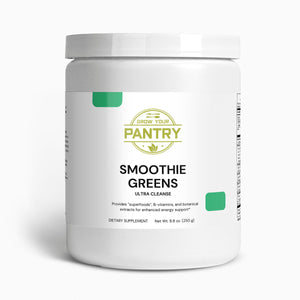Pregnancy And Sauerkraut: Complete Guide

The US Food and Drug Administration (FDA) authority recommends that pregnant women should avoid unpasteurized fermented products such as sauerkraut during pregnancy and breastfeeding. This guide goes into detail the reasoning behind this recommendation and the efficacy of consuming sauerkraut during pregnancy. Ref: fda.gov.
Medical Disclaimer
This article is only meant to be informative and should not replace professional medical opinion. This is not certified medical advice - we have gathered resources from around the web with links for you to check out. If you have any concerns or worries, you should seek professional medical advice immediately, and always follow your physician's advice.
What Is Sauerkraut?
Sauerkraut refers to fermented cabbages that have been pickled in brine. The process begins with slicing the cabbages into thin slices, which are then mixed with salted and pressed to produce brine that's used to establish an anaerobic environment around the fermenting cabbages. Naturally occurring bacteria and yeast cells found on the raw cabbage leaves start breaking down carbs in the cabbages and producing lactic acid. Over a period of 20 days, the sauerkraut will ferment and gain a mildly acidic flavor while also gaining probiotic content.
What Is The Difference Between Raw Sauerkraut And Other Types?
|
Difference |
Raw Sauerkraut |
Canned Sauerkraut |
Pasteurized Sauerkraut |
|
Probiotic Content |
Raw Sauerkraut contains billions of live probiotics |
No probiotics |
No probiotic content |
|
Probiotic benefits |
Raw sauerkraut contains probiotic benefits |
No probiotic benefits |
No probiotic benefits |
|
Nutrient Content |
Contains vitamins and minerals |
Contains fewer nutrients as the canning process can denature vitamins |
Contains fewer nutrients |
|
Consumption During Pregnancy |
Prohibited by the FDA |
Safe for consumption during pregnancy - check details first |
Safe for consumption during pregnancy - check details first |
The consumption of sauerkraut during pregnancy is quite the conundrum; on the one hand, you have a superfood with proclaimed health benefits. On the other hand, you have a fermented food that could pose a potential risk to the pregnant mother and unborn child.
Can Pregnant Women Eat Raw Foods?
The choice of whether to eat raw food when pregnant will depend on the type of food you are dealing with. According to FDA, raw fruits and vegetables should be washed well before consumption at all times to remove any bacteria. However, other foods that can contain contaminants will require to be fully cooked before consumption if you are pregnant. Ref: fda.gov.
Risk Associated With Eating Sauerkraut When Pregnant
Eating raw sauerkraut while pregnant can significantly increase the risk of developing bacteria infection. This is because pregnancy reduces the effectiveness of the immune system, making it much easier for infections to occur as a result of consuming food with live bacteria. Ref: nih.gov.
Are There Health Benefits Of Eating Sauerkraut When Pregnant?
1. Vitamins And Minerals
Sauerkraut contains substantial amounts of vitamins and minerals, which are in high demand during pregnancy both for the mother and the unborn baby.
A single cup of sauerkraut contains:
Macronutrients
- 1 g of protein: the body requires proteins to grow its structures, functions, and replace worn-out organs and tissue cells.
- 41% DV Sodium: sodium plays a critical role in regulating the water balance within the body cells and in the blood as well as promoting the normal muscle and nerve function.
- 23% DV vitamin C: vitamin C hastens the process of healing wounds and scar tissue formation.
- 27 calories
- 15% DV vitamin K1
- 12% DV Iron
Micronutrients
- 9 % DV Manganese: manganese is a trace mineral that's required in the metabolism process.
- 11% DV vitamin B6: vitamin B6 aids in the metabolism and creation of neurotransmitters in the nervous system.
- 9% DV folate: folate plays a critical role in the creation of red blood cells and helping tissues to grow.
- 15% DV copper
- 5% DV potassium
Ref: fdc.gov
2. Dietary Fiber
A single cup serving of sauerkraut contains 4 g of dietary fiber, which, although it doesn't get digested, does play a major role in softening and bulking up the stool. This makes it much easier to pass, thus preventing constipation.
Frequently Asked Questions
Can You Eat Unpasteurized Sauerkraut When Pregnant?
No, you should avoid unpasteurized sauerkraut during pregnancy as it might lead to harmful bacterial infections
Are Fermented Foods Safe In Pregnancy?
Pasteurized fermented foods are considered to be generally safe during pregnancy as the heat treatment kills off all potential infectious bacteria in the food.
Can You Buy Unpasteurized Sauerkraut?
Yes, unpasteurized sauerkraut can be bought from local health food stores, grocery stores, or simply order some from Amazon.
What Spices To Avoid While Pregnant?
During pregnancy, you should avoid spices such as fenugreek, asafoetida, garlic, angelica, and peppermint as they can stimulate the uterus leading to contractions and preterm labor which can induce a miscarriage.
Can I Drink Kombucha While Pregnant?
It's recommended avoiding Kombucha during pregnancy due to its probiotic, alcohol, and caffeine content.
Can You Eat Raw Cabbage While Pregnant?
Yes, it's perfectly safe to eat raw cabbages during pregnancy; just make sure they are thoroughly washed before consumption.
Can You Drink Water Kefir When Pregnant?
It's not recommended to consume water kefir during pregnancy unless it's pasteurized.
Can You Eat Shrimp Paste When Pregnant?
You can only eat shrimp paste during pregnancy if it has undergone cooking until its melting and slightly burnt.
Why Is Sauerkraut Good For You?
Yes, sauerkraut provides essential probiotics, vitamins, minerals, and dietary fiber.
Can I Eat Miso While Pregnant?
You can still consume miso during pregnancy if it's well cooked through.
What Do You Eat With Sauerkraut?
Sauerkraut matches perfectly with all meat-based meals.






